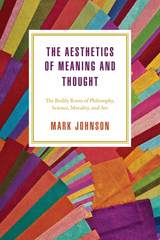
This book gathers the best of philosopher Mark Johnson’s essays addressing questions of our embodiment as they deal with aesthetics—which, he argues, we need to rethink so that it takes into account the central role of body-based meaning. Viewed that way, the arts can give us profound insights into the processes of meaning making that underlie our conceptual systems and cultural practices. Johnson shows how our embodiment shapes our philosophy, science, morality, and art; what emerges is a view of humans as aesthetic, meaning-making creatures who draw on their deepest physical processes to make sense of the world around them.
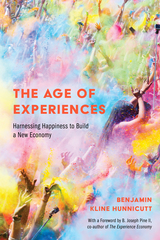
In The Age of Experiences, Benjamin Kline Hunnicutt examines how the advance of happiness science is impacting the economy, making possible new experience-products that really make people happy and help forward-looking businesses expand and develop new technologies. In today’s marketplace there is less interest in goods and services and more interest in buying and selling personal improvements and experiences. Hunnicutt traces how this historical shift in consumption to the “softer” technologies of happiness represents not only a change in the modern understanding of progress, but also a practical, economic transformation, profoundly shaping our work and the ordering of our life goals.
Based on incisive historical research, Hunnicutt demonstrates that we have begun to turn from material wealth to focus on the enrichment of our personal and social lives. The Age of Experiences shows how industry, technology, and the general public are just beginning to realize the potential of the new economy. Exploring the broader implications of this historical shift, Hunnicutt concludes that the new demand for experiences will result in the reduction of work time, the growth of jobs, and the regeneration of virtue—altogether an increasingly healthy public life.

What does it mean to be aging in Chile as a migrant? Drawing on extensive ethnographic fieldwork, Ageing with Smartphones in Urban Chile analyzes the experience of aging for Peruvian migrants aged around sixty who have lived in Chile for more than twenty years. Their lives, we discover, are informed by a series of experiences of being ‘in between’. They live between two countries, two generations, and two different stages in life, between giving care and not wanting care, and between a continuing legacy and not transmitting legacy. By focusing on the entanglement of aging, migration, and technology, this book is an ethnographic contribution to an unexplored subject in the vast literature on migration studies in Chile.


“Experience” is a thoroughly political category, a social and historical product not authored by any individual. At the same time, “the personal is political,” and one's own lived experience is an important epistemic resource. In Anaesthetics of Existence Cressida J. Heyes reconciles these two positions, drawing on examples of things that happen to us but are nonetheless excluded from experience. If for Foucault an “aesthetics of existence” was a project of making one's life a work of art, Heyes's “anaesthetics of existence” describes antiprojects that are tacitly excluded from life—but should be brought back in. Drawing on critical phenomenology, genealogy, and feminist theory, Heyes shows how and why experience has edges, and she analyzes phenomena that press against those edges. Essays on sexual violence against unconscious victims, the temporality of drug use, and childbirth as a limit-experience build a politics of experience while showcasing Heyes's much-needed new philosophical method.
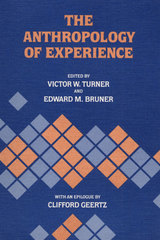
explore how people actually experience their culture and how those experiences are expressed in forms as varied as narrative, literary work, theater, carnival, ritual, reminiscence, and life review. Their studies will be
of special interest for anyone working in anthropological theory, symbolic
anthropology, and contemporary social and cultural anthropology, and useful as well for other social scientists, folklorists, literary theorists, and philosophers.
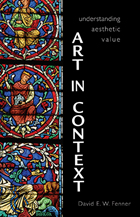
Art in Context is a systematic, historically situated, and historically evidenced attempt to demonstrate the importance of considering contexts that will, in the vast majority of cases, increase the aesthetic experience. While focusing on distance, detachment, aestheticism, art for art’s sake, and formalism can at times be instructive and interesting, such approaches risk missing the larger and often central issue of the piece.
Based on the findings of philosophers and critics, and on artwork throughout
history, Art in Context provides a solid foundation for understanding and valuing a work of art in perspective as well as within the particular world in which it exists.
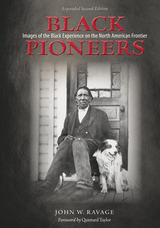
Using public and private collections in every western state and in Canada, Ravage has gathered more than three hundred photographs, line drawings, lithographs, stereoviews, and other images. This new edition also adds sections on black entertainers and ranchers, a chapter on the dating of historic photographs and their genealogical significance, as well as an expanded bibliography. All aid understanding of the black frontier experience.
Ravage goes beyond the stereotypical photography of the era, which often reflected white fears and prejudices, to present the works of frontier photographers. Galveston’s Lucius Harper, Denver’s John Green, and the Northwest’s nomadic James Presley Ball all bring life to their subjects and meaning to their presence in the American West. Black Pioneers is a vibrant visual document of the profound influence blacks had on communal and frontier history.
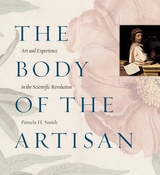
From goldsmiths to locksmiths and from carpenters to painters, artists and artisans were much sought after by the new scientists for their intimate, hands-on knowledge of natural materials and the ability to manipulate them. Drawing on a fascinating array of new evidence from northern Europe including artisans' objects and their writings, Smith shows how artisans saw all knowledge as rooted in matter and nature. With nearly two hundred images, The Body of the Artisan provides astonishingly vivid examples of this Renaissance synergy among art, craft, and science, and recovers a forgotten episode of the Scientific Revolution-an episode that forever altered the way we see the natural world.

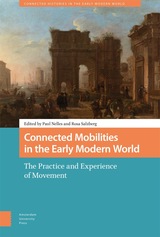
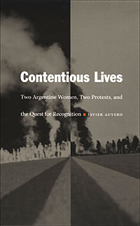
Auyero reconstructs Nana’s and Laura’s biographies through oral histories and diaries. Drawing on interviews with many other protesters, newspaper articles, judicial records, government reports, and video footage, he provides sociological and historical context for their stories. The women’s accounts reveal the frustrations of lives overwhelmed by gender domination, the deprivations brought about by hyper-unemployment and the withering of the welfare component of the state, and the achievements and costs of collective action. Balancing attention to large-scale political and economic processes with acknowledgment of the plurality of meanings emanating from personal experiences, Contentious Lives is an insightful, penetrating, and timely contribution to discussions of popular resistance and the combined effects of globalization, neoliberal economic policies, and political corruption in Argentina and elsewhere.
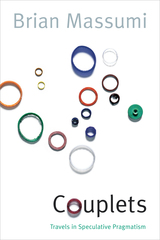
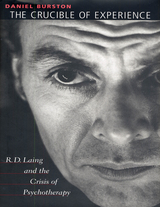
One of the great rebels of psychiatry, R. D. Laing challenged prevailing models of madness and the nature and limits of psychiatric authority. In this brief and lucid book, Laing’s widely praised biographer distills the essence of Laing’s vision, which was religious and philosophical as well as psychological.
The Crucible of Experience reveals Laing’s philosophical debts to existentialism and phenomenology in his theories of madness and sanity, family theory and family therapy. Daniel Burston offers the first detailed account of Laing’s practice as a therapist and of his relationships—often contentious—with his friends and sometime disciples. Burston carefully differentiates between Laing and “Laingians,” who were often clearer, more confident, and more simplistic than their teacher.
While he examines Laing’s theories of madness, Burston focuses most provocatively on Laing’s views of sanity and normality and on his recognition, toward the end of his life, of the essential place of holiness in human experience. In a powerful last chapter, Burston shows that Laing foresaw the present commercialization of medicine and asked pointed questions about what the meaning of sanity and the future of psychotherapy in such a world could be. In this, as in other matters, Laing’s questions of a generation ago remain questions for our time.
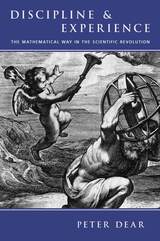
Peter Dear investigates the nature of the change that occurred during this period, focusing particular attention on evolving notions of experience and how these developed into the experimental work that is at the center of modern science. He examines seventeenth-century mathematical sciences—astronomy, optics, and mechanics—not as abstract ideas, but as vital enterprises that involved practices related to both experience and experiment. Dear illuminates how mathematicians and natural philosophers of the period—Mersenne, Descartes, Pascal, Barrow, Newton, Boyle, and the Jesuits—used experience in their argumentation, and how and why these approaches changed over the course of a century. Drawing on mathematical texts and works of natural philosophy from all over Europe, he describes a process of change that was gradual, halting, sometimes contradictory—far from the sharp break with intellectual tradition implied by the term "revolution."

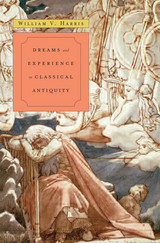
From the Iliad to Aristophanes, from the gospel of Matthew to Augustine, Greek and Latin texts are constellated with descriptive images of dreams. Some are formulaic, others intensely vivid. The best ancient minds—Plato, Aristotle, the physician Galen, and others—struggled to understand the meaning of dreams.
With Dreams and Experience in Classical Antiquity the renowned ancient historian William Harris turns his attention to oneiric matters. This cultural history of dreams in antiquity draws on both contemporary post-Freudian science and careful critiques of the ancient texts. Harris traces the history of characteristic forms of dream-description and relates them both to the ancient experience of dreaming and to literary and religious imperatives. He analyzes the nuances of Greek and Roman belief in the truth-telling potential of dreams, and in a final chapter offers an assessment of ancient attempts to understand dreams naturalistically.
How did dreaming culture evolve from Homer’s time to late antiquity? What did these dreams signify? And how do we read and understand ancient dreams through modern eyes? Harris takes an elusive subject and writes about it with rigor and precision, reminding us of specificities, contexts, and changing attitudes through history.


Media do not simply portray places that already exist; they actually produce them. In exploring how world populations experience "place" through media technologies, the essays included here examine how media construct the meanings of home, community, work, nation, and citizenship.
Tracing how media reconfigure the boundaries between public and private-and global and local-to create "electronic elsewheres," the essays investigate such spaces and identities as the avatars that women are creating on Web sites, analyze the role of satellite television in transforming Algerian neighborhoods, inquire into the roles of radio and television in Israel and India, and take a skeptical look at the purported novelty of the "new media home."
Contributors: Asu Aksoy, Istanbul Bilgi U; Charlotte Brunsdon, U of Warwick; Ratiba Hadj-Moussa, York U (Toronto); Tamar Liebes-Plesner, Hebrew U; David Morley, Goldsmiths, U of London; Lisa Nakamura, U of Illinois; Arvind Rajagopal, New York U; Kevin Robins, Goldsmiths, U of London; Jeffrey Sconce, Northwestern U; Marita Sturken, New York U; and Shunya Yoshimi, U of Tokyo.


This volume launches a far-reaching exploration into the meaning, manifestations, and significance of ethnicity in modern society and politics. The authors seek neither to celebrate nor to deplore ethnicity, but rather to examine it as a basis of social organization which in modern societies has achieved a significance comparable to that of social class. Ethnicity indicates that minority groups around the world are no longer doing what society for hundreds of years has expected them to do—assimilate, disappear, or endure as exotic, troublesome survivors. Instead, their numbers expanded by immigration, their experiences and struggles mirrored to one another by the international mass media, minorities have become vital, highly conscious forces within almost all contemporary societies.
Ethnicity has played a pivotal role in recent social change; it has evolved into a political idea, a mobilizing principle, and an effective means of advancing group interests. Together with Glazer and Moynihan, Harold Isaacs, Talcott Parsons, Martin Kilson, Orlando Patterson, Daniel Bell, Milton Esman, Milton Gordon, William Petersen, and others bring analytic clarity to the rich concept of “ethnicity.” Their effort to explain why ethnic identity has become more salient, ethnic self-assertion stronger, and ethnic conflict more intense helps to develop a catholic view of ethnicity: this surpasses limited categories of race and nationality; includes the old world and the new, economically developed as well as developing nations; and offers a broad variety of theoretical approaches. Presenting the readers with a wealth of perceptions, points of view, and examples, Ethnicity: Theory and Experience will provoke discussion and argument for years to come.


The fourth volume in the Terra Foundation Essays series, Experience considers the possibility of immediacy, or the idea that we can directly relate to the past by way of an artifact or work of art. Without discounting the matrix of codes involved in both the production and reception of art, contributors to Experience emphasize the sensibility of the interpreter; the techniques of art historical writing, including its affinity with fiction and its powers of description; the emotional charge—the punctum—that certain representations can deliver. These and other topics are examined through seven essays, addressing different periods in American art.

This is a major book about one of the luminaries of the golden age of Spanish literature. In spite of his great reputation, Lope de Vega is to most of us merely a name, in part because of the prodigious quantity and variety of his plays and other writings in verse and prose. Alan Trueblood's book does not pretend to survey all of Lope's works or to touch on all the events of his colorful career; yet it probes the mind and heart, and art, of Lope as no other study in English has done.
Trueblood pursues the artistic consequences of a key experience in Lope's life, the four-year love affair with Elena Osorio that terminated violently in 1587. (The rejected Lope, age twenty-five, wrote slanderous verses about Elena's family and associates, was jailed on charges of libel, and was sentenced to ten years' exile.) Notwithstanding his subsequent marriages and liaisons, his mounting literary fame in Spain and abroad, and his eventual dedication to the Church as a priest, for forty-five years this experience reverberated intermittently in his writings, culminating in the great prose dialogue La Dorotea. Trueblood's demonstration of the increasing objectivity and sympathy with which Lope treats Elena/ Dorotea--in ballads, in sonnets, in plays, in La Dorotea--is psychologically as well as aesthetically revealing.
Trueblood provides by far the fullest analysis and elucidation of Lope's masterpiece, La Dorotea, that it has ever received--and in the process he probes the nature of literary creativity, the symbiosis between personal experience and artistic expression, in contexts going well beyond Lope and his age. Because the book will appeal to many readers who do not know Spanish, all quotations have been translated into English.
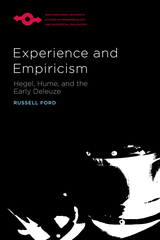
A clarifying examination of Gilles Deleuze’s first book shows how he would later transform the problem of immanence into the problem of difference
Despite the wide reception Gilles Deleuze has received across the humanities, research on his early work has remained scant. Experience and Empiricism remedies that gap with a detailed study of Deleuze’s first book, Empiricism and Subjectivity, which is devoted to the philosophical project of David Hume. Russell Ford argues that this work is poorly understood when read simply as a stand-alone study on Hume. Its significance only becomes apparent within the context of a larger problematic that dominated, and continues to inform, modern European philosophy: the conceptual constitution of a purely immanent account of existence. While the importance of this debate is recognized in contemporary scholarship, its genealogy—including Deleuze’s place within it—has been underappreciated. This book shows how Deleuze directly engages in an ongoing debate between his teachers Jean Wahl and Jean Hyppolite over experience and empiricism, an intervention that restages the famous encounter between rationalism and empiricism that yielded Kant’s critical philosophy. What, Deleuze effectively asks, might have happened had Hume been the one roused from his empirical dogmatic slumber by the rationalist challenge of Kant?
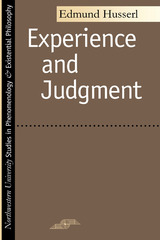
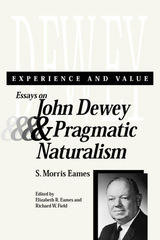
Experience and Value: Essays on John Dewey and Pragmatic Naturalism brings together twelve philosophical essays spanning the career of noted Dewey scholar, S. Morris Eames. The volume includes both critiques and interpretations of important issues in John Dewey’s value theory as well as the application of Eames’s pragmatic naturalism in addressing contemporary problems in social theory, education, and religion.
The collection begins with a discussion of the underlying principles of Dewey’s pragmatic naturalism, including the concepts of nature, experience, and philosophic method. Essays “Experience and Philosophical Method in John Dewey” and “Primary Experience in the Philosophy of John Dewey” develop what Eames believed to be a central theme in Dewey’s thought and provide a theoretical framework for subsequent discussion.
The volume continues with specific applications of this framework in the areas of value theory, moral theory, social philosophy, and the philosophy of religion. Eames’s analysis of value exposes the connection between the immediately felt values of experience and the more sophisticated judgments of value that are the product of reflection. From this basis in moral theory, Eames considers the derivation of judgments of obligation from judgments of fact. This discussion provides a grounding for a consideration of contemporary social issues directed by naturalistic and scientific principles.
In the third section, with regard to educational theory, Eames considers possible resolutions of the current dichotomy between the factual worldview of science and the humanistic worldview of the liberal arts. The comprehensive article, “Dewey’s Views of Truth, Beauty, and Goodness,” connects the essays of the first and second sections and explores the placement of Dewey’s value theory with respect to morals and aesthetics. With “Creativity and Democracy,” in the fourth section, Eames also considers the concept of democracy from the standpoint of current and historical issues faced by society. This article hints at a major project of Eames’s intellectual life—the theory of democracy.
The volume concludes with a discussion of the difficulty of maintaining the values of religious experience in a scientifically and technologically sophisticated world, the very topic that first brought Eames to philosophy—the meaning of religion and the religious life. Suggested solutions are offered in “The Lost Individual and Religious Unity.”
Experience and Value: Essays on John Dewey and Pragmatic Naturalism illuminates Eames’ life of inquiry, a life that included moral, social, aesthetic, and religious dimensions of value—all suffused with the influence of John Dewey.
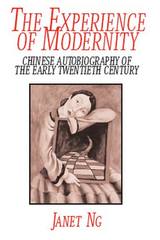
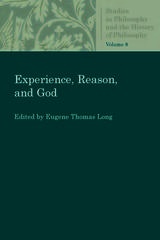
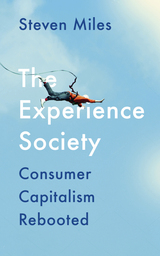
The technologically-driven world we live in is no closer to securing the utopian ideal of a leisure society. Instead, the pursuit of leisure is often an attempt to escape our everyday existence. Exploring examples including sport, architecture, travel and social media, Steven Miles investigates how consumer culture has colonised 'experiences', revealing the ideological and psycho-social tensions at the heart of the 'experience society'.
The first critical analysis of the experience economy by a UK sociologist sheds light on capitalism's ever more sophisticated infiltration of the everyday.
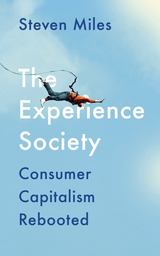
The technologically-driven world we live in is no closer to securing the utopian ideal of a leisure society. Instead, the pursuit of leisure is often an attempt to escape our everyday existence. Exploring examples including sport, architecture, travel and social media, Steven Miles investigates how consumer culture has colonized 'experiences', revealing the ideological and psycho-social tensions at the heart of the 'experience society'.
The first critical analysis of the experience economy by a UK sociologist sheds light on capitalism's ever more sophisticated infiltration of the everyday.
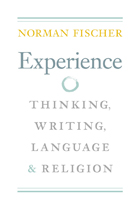
Raised in a Conservative Jewish family, Fischer embraced the twin practices of Zen Buddhism and innovative poetics in San Francisco in the early 1970s. His work includes original poetry, descriptions of Buddhist practice, translations of the Hebrew psalms, and eclectic writings on a range of topics from Homer to Heidegger to Kabbalah. Both Buddhist priest and participant in avant-garde poetry’s Language movement, Fischer has limned the fertile affinities and creative contradictions between Zen and writing, accumulating four decades of rich insights he shares in Experience.
Fischer’s work has been deeply enriched through his collaborations with leading rabbis, poets, artists, esteemed Zen Buddhist practitioners, Trappist monks, and renowned Buddhist leaders, among them the Dalai Lama. Alone and with others, he has carried on a deep and sustained investigation into the intersection of writing and consciousness as informed by meditation.
The essays in this artfully curated collection range across divers, fascinating topics such as time, the Heart Sutra, God in the Hebrew psalms, the supreme “uselessness” of art making, “late work” as a category of poetic appreciation, and the subtle and dubious notion of “religious experience.” From the theoretical to the revealingly personal, Fischer’s essays, interviews, and notes point toward a dramatic expansion of the sense of religious feeling in writing.
Readers who join Fischer on this path in Experience can discover how language is not a description of experience, but rather an experience itself: shifting, indefinite, and essential.


Experimental Dining examines the construction of the world of restaurants and their creative methods, the experience of dining, and the broader ideological frames within which the work takes place, bringing together ideas around food, philosophy, performance and cultural politics to offer an interdisciplinary understanding of the practice and experience of creative restaurants. The author contends that the work of the experimental restaurant, while operating explicitly within an economy of experiences, is not absolutely determined by that political or economic context. Its practice has the potential to appeal to more than idle curiosity for novelty. It can be unsettling and revealing, provocative and evocative, personal and political, experimental and considered, thoughtful and sensual. Or in other words, that the food event can be art.

With the flowering of postcolonialism, we return to Frantz Fanon, a leading theorist of the struggle against colonialism. In this thorough reinterpretation of Fanon’s texts, Ato Sekyi-Otu ensures that we return to him fully aware of the unsuspected formal complexity and substantive richness of his work. A Caribbean psychiatrist trained in France after World War II and an eloquent observer of the effects of French colonialism on its subjects from Algeria to Indochina, Fanon was a controversial figure—advocating national liberation and resistance to colonial power in his bestsellers, Black Skin, White Masks and The Wretched of the Earth.
But the controversies attending his life—and death, which some ascribed to the CIA—are small in comparison to those surrounding his work. Where admirers and detractors alike have seen his ideas as an incoherent mixture of Existentialism, Marxism, and psychoanalysis, Sekyi-Otu restores order to Fanon’s oeuvre by reading it as one dramatic dialectical narrative. Fanon’s Dialectic of Experience invites us to see Fanon as a dramatist enacting a movement of experience—the drama of social agents in the colonial context and its aftermath—in a manner idiosyncratically patterned on the narrative structure of Hegel’s Phenomenology of Spirit. By recognizing the centrality of experience to Fanon’s work, Sekyi-Otu allows us to comprehend this much misunderstood figure within the tradition of political philosophy from Aristotle to Arendt.

Federalism and Regional Development is the resuit of the first German-American geography seminar, held at the University of Texas in September 1979. The chapters deal with the impact of geographic policy planning by various governmental agencies in both the Federal Republic of Germany and the United States, two countries with federal systems of government. Although various bureaucratic offices at the federal, state, county, and city levels became involved in spatial planning in both countries, no overall coordination of development planning existed. The contributors to this volume offer many theoretical and empirical perspectives on the evolution of federal policies and programs and their impact on geographic planning activities at all levels of government. The topics covered range from actual regional case studies in both countries to the framework of the agencies concerned with spatial planning. Numerous maps and tables document the data resources of the contributors and yield useful insights on the workings of the federal system.

Drawing on the speculative empiricism of philosopher Alfred North Whitehead, Hansen reveals how new media call into play elements of sensibility that greatly affect human selfhood without in any way belonging to the human. From social media to data-mining to new sensor technologies, media in the twenty-first century work largely outside the realm of perceptual consciousness, yet at the same time inflect our every sensation. Understanding that paradox, Hansen shows, offers us a chance to put forward a radically new vision of human becoming, one that enables us to reground the human in a non-anthropocentric view of the world and our experience in it.


In this study, Ronald Berman examines the work of the critic/novelist Edmund Wilson and the art of F. Scott Fitzgerald and Ernest Hemingway as they wrestled with the problems of language, experience, perception and reality in the "age of jazz." By focusing specifically on aesthetics—the ways these writers translated everyday reality into language—Berman challenges and redefines many routinely accepted ideas concerning the legacy of these authors.
Fitzgerald is generally thought of as a romantic, but Berman shows that we need to expand the idea of Romanticism to include its philosophy. Hemingway, widely viewed as a stylist who captured experience by simplifying language, is revealed as consciously demonstrating reality's resistance to language. Between these two renowned writers stands Wilson, who is critically influenced by Alfred North Whitehead, as well as Dewey, James, Santayana, and Freud.
By patiently mapping the correctness of these philosophers, historians, literary critics and writers, Berman aims to open a gateway into the era. This work should be of interest to scholars of American literature, philosophy and aesthetics; to academic libraries; to students of intellectual history; and to general readers interested in Fitzgerald, Hemingway and Wilson.
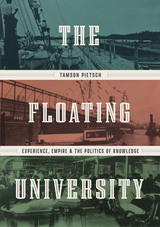
In 1926, New York University professor James E. Lough—an educational reformer with big dreams—embarked on a bold experiment he called the Floating University. Lough believed that taking five hundred American college students around the globe by ship would not only make them better citizens of the world but would demonstrate a model for responsible and productive education amid the unprecedented dangers, new technologies, and social upheavals of the post–World War I world. But the Floating University’s maiden voyage was also its last: when the ship and its passengers returned home, the project was branded a failure—the antics of students in hotel bars and port city back alleys that received worldwide press coverage were judged incompatible with educational attainment, and Lough was fired and even put under investigation by the State Department.
In her new book, Tamson Pietsch excavates a rich and meaningful picture of Lough’s grand ambition, its origins, and how it reveals an early-twentieth-century America increasingly defined both by its imperialism and the professionalization of its higher education system. As Pietsch argues, this voyage—powered by an internationalist worldview—traced the expanding tentacles of US power, even as it tried to model a new kind of experiential education. She shows that this apparent educational failure actually exposes a much larger contest over what kind of knowledge should underpin university authority, one in which direct personal experience came into conflict with academic expertise. After a journey that included stops at nearly fifty international ports and visits with figures ranging from Mussolini to Gandhi, what the students aboard the Floating University brought home was not so much knowledge of the greater world as a demonstration of their nation’s rapidly growing imperial power.

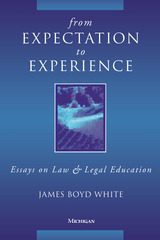
The essays here are united by two basic themes. First, the essays suggest that law can usefully be regarded not only as a set of rules designed to produce results in the material world, as it usually is regarded, but also as an imaginative and intellectual activity that has as its end the claim of meaning for human experience, both individual and collective. Second, they argue that education, including in the law, works by the constant modification of expectation by experience.
White claims that as we grow, whether as individuals or as a community, we constantly shape our expectations to our experiences. This happens with particular force and clarity in the law, which seeks to create both a certain set of expectations--this is how it works as a system of regulation--and a series of occasions and methods for their revision. White's interest is in the way these understandings can affect legal teaching, practice, and criticism.
The essays in this book examine such topics as the nature of legal education; the possibilities for writing in the law for both judges and lawyers; the relation between the practice of making and claiming meaning as it works in the law and in literatures more usually though of as imaginative, such as poetry or drama; the ways in which the law talks, and ought to talk, about business corporations, religion, and individual judgments; and the ethical possibilities of the practice of law when it is conceived of as a field for the making of meaning.
From Expectation to Experience will be of interest to lawyers, legal scholars, as well as students of law, law and literature, and ethics and literature.
James Boyd White is Hart Wright Professor of Law, Professor of English, and Adjunct Professor of Classical Studies, University of Michigan.
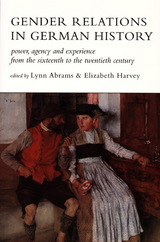
Topics include childbirth, abortion, and the female body in early modern Germany; the roots of German feminism; gender, class, and medicine during World War I and during the Weimar republic; female homosexuality during the Nazi period; East and West German reconstruction following World War II and the formation of a gendered consumer culture.
This book will stimulate readers to think more deeply about the importance of gender in German history, and prove to be an invaluable resource for those interested in women’s studies and in German and European history.
Contributors. Lynn Abrams, Elizabeth Harvey, Dagmar Herzog, Kate Lacey, Katherine Pence, Ulinka Rublack, Claudia Schoppman, Regina Schulte, Cornelie Usborne, Heide Wunder


Martin Heidegger’s Being and Time can be broadly termed a transcendental inquiry into the structures that make human experience possible. Such an inquiry reveals the conditions that render human experience intelligible. Using Being and Time as a model, I attempt to show that Alfred North Whitehead’s Process and Reality not only aligns with Being and Time in opposing many elements of traditional Western philosophy but also exhibits a similar transcendental inquiry.
With this reading, Process and Reality contains concepts much like Being-in-the-world, ecstatic temporality, and others found in Being and Time. More important, this interpretation considers Whitehead’s treatment of human experience paradigmatic for understanding his cosmological scheme in general. Finally, the results of this study are employed to sketch a phenomenology of holy experience.
— Prefatory Note to Heidegger and Whitehead


The two volumes of this investigation into how we perceive sacred architecture propose an original interpretation of built environments as ritual-architectural events.
Exploring the world's cultures and religious traditions, Volume One maps out patterned responses to sacred architecture according to the human experience, mechanism, interpretation, and comparison of architecture. Volume Two, an exercise in comparative morphology, offers a comprehensive framework of ritual-architectural priorities by looking at architecture as orientation, as commemoration, and as ritual context.

The two volumes of this investigation into how we perceive sacred architecture propose an original interpretation of built environments as ritual-architectural events.
Exploring the world's cultures and religious traditions, Volume One maps out patterned responses to sacred architecture according to the human experience, mechanism, interpretation, and comparison of architecture. Volume Two, an exercise in comparative morphology, offers a comprehensive framework of ritual-architectural priorities by looking at architecture as orientation, as commemoration, and as ritual context.
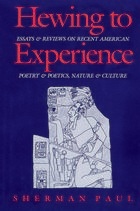
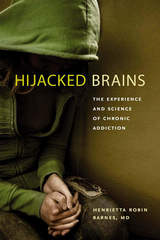
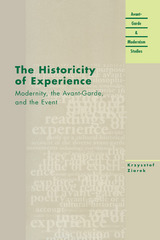
The four poets Ziarek considers—Gertrude Stein, Velimir Khlebnikov, Miron Biaoszewski, and Susan Howe—demonstrate the broad reach of and variety of forms taken by the avant-garde revision of experience and aesthetics. Moreover, this quartet illustrates how the main operative concepts and strategies of the avant-garde underpinned the practices of canonical writers. A profound philosophical meditation on language, modernity, and the everyday, The Historicity of Experience offers a fundamental reconceptualization of the avant-garde in relation to experience.
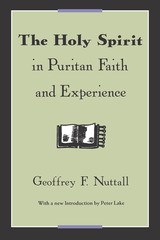
In a new Introduction, Peter Lake discusses the relevance of Nuttall's book to, and its influence on, major works in seventeenth-century English history written since 1946.

Wresting the language of affinity away from accusations of sticky sentiment and manipulative marketing, Felski argues that “being hooked” is as fundamental to the appreciation of high art as to the enjoyment of popular culture. Hooked zeroes in on three attachment devices that connect audiences to works of art: identification, attunement, and interpretation. Drawing on examples from literature, film, music, and painting—from Joni Mitchell to Matisse, from Thomas Bernhard to Thelma and Louise—Felski brings the language of attachment into the academy. Hooked returns us to the fundamentals of aesthetic experience, showing that the social meanings of artworks are generated not just by critics, but also by the responses of captivated audiences.

Human beings have lived by very different conceptions of the good life. In this book, Stuart Hampshire argues that no individual and no modern society can avoid conflicts between incompatible moral interests. Philosophers have tried in the past to find some underlying moral idea of justice which could resolve these conflicts and would be valid for any society. Hampshire claims that there can be no such thing. States can be held together, and war between them avoided, only by respect for the political process itself, and it is in these terms that justice must be defined.
The book closely examines the critical relationship between morality and justice, paying particular attention to Hume's moral subjectivism (which Hampshire disputes) and proposing a reply to Machiavelli's claim that the realities of politics inevitably oblige leaders to choose between unavoidable evils.
Most academic and moral philosophy, Hampshire argues, has been a fairy tale, representing ideals of private innocence rather than the realities of public experience. Conflicts between incompatible moral interests are as unavoidable in social and international arenas as they are in the lives of individuals. Philosophers, politicians, and theologians have all looked for an underlying moral consensus that will be valid for any just society. But the diversity of the human species and important differences in how various cultures define the good life militate against the formation of any such consensus. Ultimately, conflicts can be mediated only by respect for procedural justice.
Hampshire believes that themes of moral philosophy come from the writer's own experience, and he has given a brief but compelling account of his own life to help the reader understand the sources of his philosophy. Combining intellectual rigor with imaginative power, in Innocence and Experience Stuart Hampshire vividly illuminates the tensions between justice and other sources of value in society and in the life of the individual.
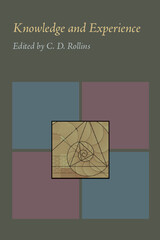
Contributors include: Hector-Neri Castañeda, Newton Garver, Arthur N. Prior, John R. Searle, G. J. Warnock, with commentary by Paul Benacerraf, V. C. Chappell, Carl Ginet, F. A. Siegler, James F. Thomson, Zeno Vendler, and Paul Ziff.


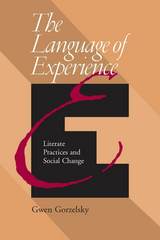
The Language of Experience examines the relationship between literacy and change--both personal and social. Gorzelsky studies three cases, two historical and one contemporary, that speak to key issues on the national education agenda.
"Struggle" is a community literacy program for urban teens and parents. It encourages them to reflect on, articulate, and revise their life goals and design and implement strategies for reaching them. To provide historical context for this and other contemporary efforts in using literacy to promote social change, Gorzelsky analyzes two radical religious and political movements of the English Civil Wars and the 1930s unionizing movement in the Pittsburgh region. Charting the similarities and differences in the function of literate practices in each case shows how different situations and contexts can foster very different outcomes.
Gorzelsky's analytic frame is drawn from Gestalt theory, which emphasizes the holistic nature of perception, communication, and learning. Through it she views how discourse and language structures interact with experience and how this interaction changes awareness and perception.
The book is methodologically innovative in its integration of a macro-social view of cultural, social, and discursive structures with a micro-social view of the potential for change embodied in them. Through her analysis and in her use of the voices of the people she studies, Gorzelsky offers a tool for analyzing individual instances of literate practices and their potential for fostering change.
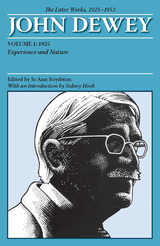
John Dewey’s Experience and Nature has been considered the fullest expression of his mature philosophy since its eagerly awaited publication in 1925.Irwin Edman wrote at that time that “with monumental care, detail and completeness, Professor Dewey has in this volume revealed the metaphysical heart that beats its unvarying alert tempo through all his writings, whatever their explicit themes.” In his introduction to this volume, Sidney Hook points out that “Dewey’s Experience and Nature is both the most suggestive and most difficult of his writings.”
The meticulously edited text published here as the first volume in the series The Later Works of John Dewey, 1925–1953spans that entire period in Dewey’s thought by including two important and previously unpublished documents from the book’s history: Dewey’s unfinished new introduction written between 1947and 1949,edited by the late Joseph Ratner, and Dewey’s unedited final draft of that introduction written the year before his death. In the intervening years Dewey realized the impossibility of making his use of the word “experience” understood. He wrote in his 1951draft for a new introduction: “Were I to write (or rewrite) Experience and Nature today I would entitle the book Culture and Nature and the treatment of specific subject-matters would be correspondingly modified. I would abandon the term ‘experience’ because of my growing realization that the historical obstacles which prevented understanding of my use of ‘experience’ are, for all practical purposes, insurmountable. I would substitute the term ‘culture’ because with its meanings as now firmly established it can fully and freely carry my philosophy of experience.”
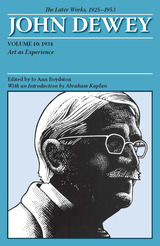
Art as Experience evolved from John Dewey’s Willam James Lectures, delivered at Harvard University from February to May 1931.
In his Introduction, Abraham Kaplan places Dewey’s philosophy of art within the context of his pragmatism. Kaplan demonstrates in Dewey’s esthetic theory his traditional “movement from a dualism to a monism” and discusses whether Dewey’s viewpoint is that of the artist, the respondent, or the critic.

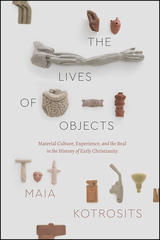
Maia Kotrosits offers a fresh perspective on objects, looking beyond physical material to consider how collective imagination shapes the formation of objects and the experience of reality. Bringing a psychoanalytic approach to the analysis of material culture, she examines objects of attachment—relationships, ideas, and beliefs that live on in the psyche—and illustrates how people across time have anchored value systems to the materiality of life. Engaging with classical studies, history, anthropology, and literary, gender, and queer studies, Kotrosits shows how these disciplines address historical knowledge and how an expanded definition of materiality can help us make connections between antiquity and the contemporary world.

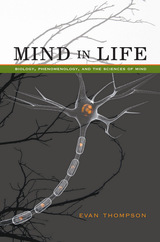
How is life related to the mind? The question has long confounded philosophers and scientists, and it is this so-called explanatory gap between biological life and consciousness that Evan Thompson explores in Mind in Life.
Thompson draws upon sources as diverse as molecular biology, evolutionary theory, artificial life, complex systems theory, neuroscience, psychology, Continental Phenomenology, and analytic philosophy to argue that mind and life are more continuous than has previously been accepted, and that current explanations do not adequately address the myriad facets of the biology and phenomenology of mind. Where there is life, Thompson argues, there is mind: life and mind share common principles of self-organization, and the self-organizing features of mind are an enriched version of the self-organizing features of life. Rather than trying to close the explanatory gap, Thompson marshals philosophical and scientific analyses to bring unprecedented insight to the nature of life and consciousness. This synthesis of phenomenology and biology helps make Mind in Life a vital and long-awaited addition to his landmark volume The Embodied Mind: Cognitive Science and Human Experience (coauthored with Eleanor Rosch and Francisco Varela).
Endlessly interesting and accessible, Mind in Life is a groundbreaking addition to the fields of the theory of the mind, life science, and phenomenology.
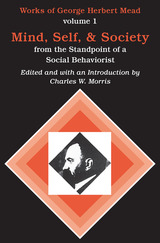
"If philosophical eminence be measured by the extent to which a man's writings anticipate the focal problems of a later day and contain a point of view which suggests persuasive solutions to many of them, then George Herbert Mead has justly earned the high praise bestowed upon him by Dewey and Whitehead as a 'seminal mind of the very first order.'"—Sidney Hook, The Nation
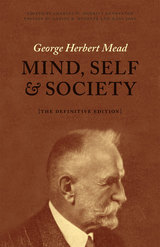
This collection gets to the heart of Mead’s meditations on social psychology and social philosophy. Its penetrating, conversational tone transports the reader directly into Mead’s classroom as he teases out the genesis of the self and the nature of the mind. The book captures his wry humor and shrewd reasoning, showing a man comfortable quoting Aristotle alongside Alice in Wonderland.
Included in this edition are an insightful foreword from leading Mead scholar Hans Joas, a revealing set of textual notes by Dan Huebner that detail the text’s origins, and a comprehensive bibliography of Mead’s other published writings. While Mead’s lectures inspired hundreds of students, much of his brilliance has been lost to time. This new edition ensures that Mead’s ideas will carry on, inspiring a new generation of thinkers.
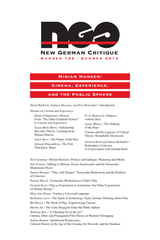
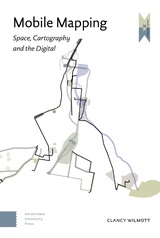
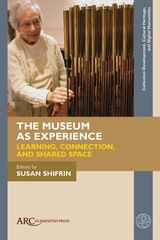
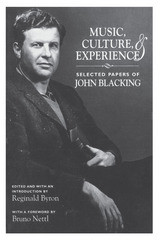
This volume brings together in one convenient source eight of Blacking's most important theoretical papers along with an extensive introduction by the editor. Drawing heavily on his fieldwork among the Venda people of South Africa, these essays reveal his most important theoretical themes such as the innateness of musical ability, the properties of music as a symbolic or quasi-linguistic system, the complex relation between music and social institutions, and the relation between scientific musical analysis and cultural understanding.
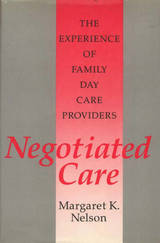
Weaving together numerous richly detailed interviews and surveys with recent feminist literature on the role of caregiving in women’s lives and investigations of women’s involvement in home-based work, this book explores the daily lives of family day care providers. Margaret K. Nelson uncovers the dilemmas providers face in their relationships with parents who bring children to them, with the children themselves, with the providers’ family members, and with representatives of the state’s regulatory system. She links these dilemmas to the contradiction between an increasing demand for personalized, cheap, informal child care services and a public policy that subjects child care providers to public scrutiny while giving them limited material and ideological support.
Nelson’s discussions with day care providers reveal considerable tensions that emerge over issues of control and intimacy. The dual motivation of business and family gives rise to problems, such as how to maintain enough distance from the parents to set limits on hours while providing personal service in a family setting. Family day care providers often enter this occupation as a way to engage in paid work and meet their own child care responsibilities. This book looks at how they manage to negotiate a setting that simultaneously involves money, trust, and caring.
Family day care represents one of the most prevalent sources of child care for working parents. It is an especially common form of care for very young children, yet it remains little studied. In the popular press, stereotypes—many of them negative—prevail. This book substitutes a thorough, detailed examination of this child care setting from a perspective that has generally been ignored-that of the caregiver. While providing useful insights into the role of caregiving in women’s lives and the phenomenon of home-based work, it contributes to the ongoing policy debates about child care.
In the series Women in the Political Economy, edited by Ronnie J. Steinberg.
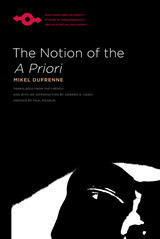
Originally published in 1966, this pivotal work of Mikel Dufrenne revises Kant’s notion of a priori, a concept previously given insufficient attention by philosophers, to realize a rich understanding that finally does justice to one of Kant’s most troubling cruxes. Following the Husserlian analytics of phenomenology, Dufrenne postulates a dualistic conception of the a priori as a structure that expresses itself outside the human subject, but also as a virtual knowledge that points to a philosophy of immediate apprehension or feeling. A friend of Paul Ricoeur, with whom he was detained as a prisoner of war during World War II, Dufrenne’s work until now has been sorely overlooked by American philosophers.

Responding to contemporary discussion about using personal accounts in academic writing, Personally Speaking: Experience as Evidence in Academic Discourse draws on classical and current rhetorical theory, feminist theory, and relevant examples from both published writers and first-year writing students to illustrate the advantages of blending experiential and academic perspectives.
Candace Spigelman examines how merging personal and scholarly worldviews produces useful contradictions and contributes to a more a complex understanding in academic writing. This rhetorical move allows for greater insights than the reading or writing of experiential or academic modes separately does. Personally Speaking foregrounds the semi-fictitious nature of personal stories and the rhetorical possibilities of evidence as Spigelman provides strategies for writing instructors who want to teach personal academic argument while supplying practical mechanisms for evaluating experiential claims.
The volume seeks to complicate and intensify disciplinary debates about how compositionists should write for publication and what kinds of writing should be taught to composition students. Spigelman not only supplies evidence as to why the personal can count as evidence but also relates how to use it effectively by including student samples that reflect particular features of personal writing. Finally, she lays the groundwork to move narrative from its current site as confessional writing to the domain of academic discourse.
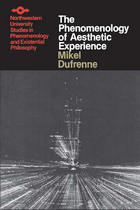
A perennial classic in the SPEP series, the work is rounded out by a detailed "Translator's Foreword" especially helpful to readers in aesthetics interested in the context and circumstances around which the original was published as well as the phenomenological background of the book.

Phenomenology’s Material Presence draws on recent work in phenomenology, embodiment, and cinema and extends the field by examining metaphysical presence in postcolonial cinema. Where other scholarship has assimilated insight from individual phenomenological thinkers, Phenomenology’s Material Presence utilizes the methods of these thinkers—Husserl, Heidegger, and Merleau-Ponty—to produce a richly textured and poetic essay that brings them into conversation. Through a meditation on three experimental videos by Trinidadian filmmaker Robert Yao Ramesar, this book makes the case that video performs an act of phenomenological inquiry. Phenomenology’s Material Presence extends our theorizing in both film studies and philosophy.
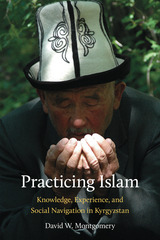
Through his years of on-the-ground research, Montgomery assembles both an anthropology of knowledge and an anthropology of Islam, demonstrating how individuals make sense of and draw meanings from their environments. He reveals subtle individual interpretations of the religion and how people seek to define themselves and their lives as “good” within their communities and under Islam.
Based on numerous in-depth interviews, bolstered by extensive survey and data collection, Montgomery offers the most thorough English-language study to date of Islam in post-Soviet Kyrgyzstan. His work provides a broad view into the cognitive processes of Central Asian populations that will serve students, researchers, and policymakers alike.

This is a major phenomenological work in which real learning works in graceful tandem with genuine and important insight. Yet this is not a work of scholarship; it is a work of philosophy, a work that succeeds both in the careful, descriptive massing of detail and in the power of its analysis of the conditions that underlie the possibility of such things as description, interpretation, perception, and meaning.
Principles of Interpretation formulates answers to these questions: How does the interpretative process proceed? What are its fundamentals? What assurance have we that our interpretations are in principal faithful to that which is to be interpreted? What conclusions are indicated concerning the past phases of our history and its present tendencies?
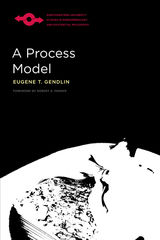
A Process Model, Gendlin’s magnum opus, offers no less than a new alternative to the dualism of mind and body. Beginning with living process, the body’s simultaneous interaction and identity with its environment, Gendlin systematically derives nonreductive concepts that offer novel and rigorous ways to think from within lived precision. In this way terms such as body, environment, time, space, behavior, language, culture, situation, and more can be understood with both great force and great subtlety.
Gendlin’s project is relevant to discussions not only in philosophy but in other fields in which life process is central—including biology, environmental management, environmental humanities, and ecopsychology. It provides a genuinely new philosophical approach to complex societal challenges and environmental issues.
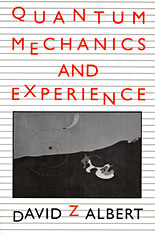
The more science tells us about the world, the stranger it looks. Ever since physics first penetrated the atom, early in this century, what it found there has stood as a radical and unanswered challenge to many of our most cherished conceptions of nature. It has literally been called into question since then whether or not there are always objective matters of fact about the whereabouts of subatomic particles, or about the locations of tables and chairs, or even about the very contents of our thoughts. A new kind of uncertainty has become a principle of science.
This book is an original and provocative investigation of that challenge, as well as a novel attempt at writing about science in a style that is simultaneously elementary and deep. It is a lucid and self-contained introduction to the foundations of quantum mechanics, accessible to anyone with a high school mathematics education, and at the same time a rigorous discussion of the most important recent advances in our understanding of that subject, some of which are due to the author himself.
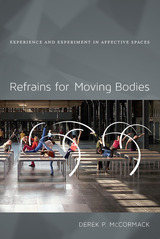

Stephen Owen's book, inspired by Chinese literature, is for all who value literature in any language. Remembrances takes up the strongest claims we can make for literature: that it can sustain life in the present and the life of the past. The past has always played a particularly powerful role in Chinese civilization. Both private memories and cultural artifacts were an inescapable part of the present, offering models for present behavior and recalling what had been lost.
Owen shows how the fascination with the past came into being in Chinese literature, some of the forms it took, and the ways readers have responded to such literature. He reflects on a series of moments in Chinese writing from the seventh century B.C. to the early nineteenth century. Through poems, anecdotes, exegeses, and one long story of an ardent collector and his wife, Owen treats a theme basic to Chinese civilization not as something exotic but as a motif fundamental to our civilization, even though its expression differs from our own.

A highly developed study of the relationships between rhetoric and public culture.
One of the most widely used ideas in scholarship of the humanities and social sciences is that of homology: a formal pattern structuring different kinds of texts, ideas, and experiences. Rhetorical Homologies explores the central meaning of this form in a variety of discourses and also examines the kind of homologies that shape audience responses to personal, public, and political issues. Barry Brummett is most interested in homologies among very different orders of experience and texts: experiences on the battlefield that are homologous to those at a dining room table, for instance. What the common patterns that underlie such cases mean, why they are interesting, and why homology is rhetorical are the subjects of this study.
Brummett focuses on a wide range of topics, from the homologies between rhetoric and weapons throughout history to the homology of ritual injuries as manifested in representations of Christian martyrs, Laurel and Hardy films, the African-American practice of playing the dozens, and televised professional wrestling. Brummett also explores the homology of the Wise Woman, using rhetorical representations of Sojourner Truth and Oprah Winfrey. In a concluding chapter, Brummett argues that the idea of homology is important in understanding how social life is organized in general and that the centrality of discourse in organizing experience makes rhetorical homologies an important perspective for general knowledge beyond the boundaries of this study.
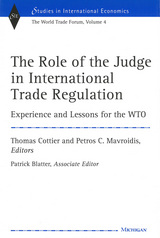
The book develops along three lines: the first a search for cases submitted to the WTO where the judge exceeded its authority; the second a comparison of the WTO with the operations of national judicial systems having different levels of integration, specifically the United States (federal level) and the EC (quasi-federal level); and the third an exploration of directions for the future of dispute settlement in the WTO.
Reflecting the diversity of its contributors, this book addresses questions of economics, political science, and law, bringing an unusual level of multidisciplinarity to this topic and context. It is designed for both academic readers and practitioners, who will find it full of practical insights as well as rich and detailed analysis.
Thomas Cottier is Professor of European and International Economic Law, University of Bern, and Managing Director, World Trade Institute, University of Bern.
Petros C. Mavroidis is Professor of Law, University of Neuchâtel. He formerly worked in the Legal Affairs Division of the World Trade Organization.
Patrick Blatter is Mavroidiss scientific collaborator.


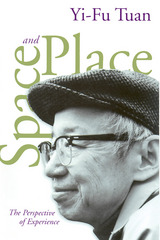
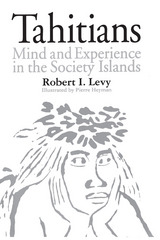
"This is a unique addition to anthropological literature. . . . No review could substitute for reading it."—Margaret Mead, American Anthropologist

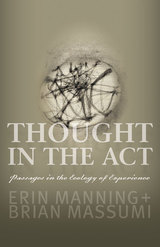
“Every practice is a mode of thought, already in the act. To dance: a thinking in movement. To paint: a thinking through color. To perceive in the everyday: a thinking of the world’s varied ways of affording itself.” —from Thought in the Act
Combining philosophy and aesthetics, Thought in the Act is a unique exploration of creative practice as a form of thinking. Challenging the common opposition between the conceptual and the aesthetic, Erin Manning and Brian Massumi “think through” a wide range of creative practices in the process of their making, revealing how thinking and artfulness are intimately, creatively, and inseparably intertwined. They rediscover this intertwining at the heart of everyday perception and investigate its potential for new forms of activism at the crossroads of politics and art.
Emerging from active collaborations, the book analyzes the experiential work of the architects and conceptual artists Arakawa and Gins, the improvisational choreographic techniques of William Forsythe, the recent painting practice of Bracha Ettinger, as well as autistic writers’ self-descriptions of their perceptual world and the experimental event making of the SenseLab collective. Drawing from the idiosyncratic vocabularies of each creative practice, and building on the vocabulary of process philosophy, the book reactivates rather than merely describes the artistic processes it examines. The result is a thinking-with and a writing-in-collaboration-with these processes and a demonstration of how philosophy co-composes with the act in the making. Thought in the Act enacts a collaborative mode of thinking in the act at the intersection of art, philosophy, and politics.
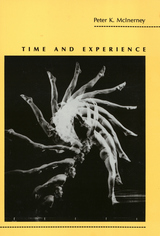
This book is the only contemporary, systematic study of the relationship of time and conscious experience. Peter K. Mclnerney examines three tightly interconnected issues: how we are able to be conscious of time and temporal entities, whether time exists independently of conscious experience, and whether the conscious experiencer exists in time in the same way that ordinary natural objects are thought to exist in time. Insight is drawn from the views of major phenomenological and existential thinkers on these issues.
Building on a detailed explication and critique of the views of Kant, Husserl, Heidegger, and Sartre, Mclnerney develops and defends his own positions. He argues that a revised version of Husserl’s three-feature theory of time-consciousness provides the best explanation of our awareness of temporal features, but that an independently real time is necessary to explain our experience of temporal passage. He also shows that human existence has some special temporal features in addition to those it shares with other entities. Time-consciousness, the conscious exercise of powers, and personal identity through time require that any temporal part of human existence be defined by and "reach across" to earlier and later parts.
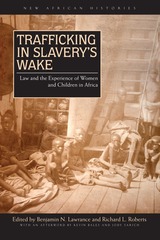
Women and children have been bartered, pawned, bought, and sold within and beyond Africa for longer than records have existed. This important collection examines the ways trafficking in women and children has changed from the aftermath of the “end of slavery” in Africa from the late nineteenth century to the present.
The formal abolition of the slave trade and slavery did not end the demand for servile women and children. Contemporary forms of human trafficking are deeply interwoven with their historical precursors, and scholars and activists need to be informed about the long history of trafficking in order to better assess and confront its contemporary forms. This book brings together the perspectives of leading scholars, activists, and other experts, creating a conversation that is essential for understanding the complexity of human trafficking in Africa.
Human trafficking is rapidly emerging as a core human rights issue for the twenty-first century. Trafficking in Slavery’s Wake is excellent reading for the researching, combating, and prosecuting of trafficking in women and children.
Contributors: Margaret Akullo, Jean Allain, Kevin Bales, Liza Stuart Buchbinder, Bernard K. Freamon, Susan Kreston, Benjamin N. Lawrance, Elisabeth McMahon, Carina Ray, Richard L. Roberts, Marie Rodet, Jody Sarich, and Jelmer Vos.
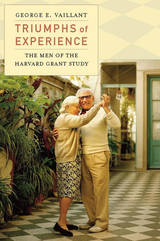
At a time when many people around the world are living into their tenth decade, the longest longitudinal study of human development ever undertaken offers some welcome news for the new old age: our lives continue to evolve in our later years, and often become more fulfilling than before.
Begun in 1938, the Grant Study of Adult Development charted the physical and emotional health of over 200 men, starting with their undergraduate days. The now-classic Adaptation to Life reported on the men’s lives up to age 55 and helped us understand adult maturation. Now George Vaillant follows the men into their nineties, documenting for the first time what it is like to flourish far beyond conventional retirement.
Reporting on all aspects of male life, including relationships, politics and religion, coping strategies, and alcohol use (its abuse being by far the greatest disruptor of health and happiness for the study’s subjects), Triumphs of Experience shares a number of surprising findings. For example, the people who do well in old age did not necessarily do so well in midlife, and vice versa. While the study confirms that recovery from a lousy childhood is possible, memories of a happy childhood are a lifelong source of strength. Marriages bring much more contentment after age 70, and physical aging after 80 is determined less by heredity than by habits formed prior to age 50. The credit for growing old with grace and vitality, it seems, goes more to ourselves than to our stellar genetic makeup.
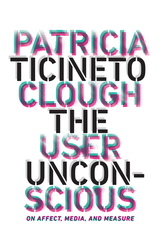
Wide-ranging essays and experimental prose forcefully demonstrate how digital media and computational technologies have redefined what it is to be human
Over the past decade, digital media has expanded exponentially, becoming an essential part of daily life. The stimulating essays and experimental compositions in The User Unconscious delve into the ways digital media and computational technologies fundamentally affect our sense of self and the world we live in, from both human and other-than-human perspectives.
Critical theorist Patricia Ticineto Clough’s provocative essays center around the motif of the “user unconscious” to advance the challenging thesis that that we are both human and other-than-human: we now live, think, and dream within multiple layers of computational networks that are constantly present, radically transforming subjectivity, sociality, and unconscious processes.
Drawing together rising strains of philosophy, critical theory, and media studies, as well as the political, social, and economic transformations that are shaping the twenty-first-century world, The User Unconscious points toward emergent crises and potentialities in both human subjectivity and sociality. Moving from affect to data, Clough forces us to see that digital media and computational technologies are not merely controlling us—they have already altered what it means to be human.

Copublished with the Utah State Historical Society. Affiliated with the Utah Division of State History, Utah Department of Heritage & Arts.
In time for the centennial of the United States’s entry into World War I, this collection of seventeen essays explores the war experience in Utah through multiple perspectives, from those of soldiers, nurses and ambulance drivers who experienced the horror of the conflict firsthand to those on the home front who were transformed by the war. Citizens supported the war financially, through service on councils of defense, with victory gardens, and by other means. Some of Utah’s Native Americans and at least one Episcopal bishop resisted the war. The terrible 1918–1919 flu pandemic impacted Utah and killed more victims around the world than those who died on the battlefields. There was a Red Scare and fight over United States participation in a League of Nations. These topics and more are explored, helping us understand the nature and complexity of the conflict and its impact on Utahns.

A reclamation of experience as the foremost concept in the work of William James, and a powerful argument for the continuing importance of his philosophy.
How does one deploy experience without succumbing to a foundationalist epistemology or an account of the subject rooted in immediately given objects of consciousness? In the wake of the so-called linguistic turn of the twentieth century, this is a question anyone thinking philosophically about experience must ask.
Alexis Dianda answers through a reading of the pragmatic tradition, culminating in a defense of the role of experience in William James’s thought. Dianda argues that by reconstructing James’s philosophical project, we can locate a model of experience that not only avoids what Wilfrid Sellars called “the myth of the given” but also enriches pragmatism broadly. First, Dianda identifies the motivations for and limitations of linguistic nominalism, insisting that critics of experience focus too narrowly on justification and epistemic practices. Then, by emphasizing how James’s concept of experience stresses the lived, affective, and nondiscursive, the argument holds that a more robust notion of experience is necessary to reflect not just how we know but how we act.
The Varieties of Experience provides a novel reconstruction of the relationship between psychology, moral thought, epistemology, and religion in James’s work, demonstrating its usefulness in tackling issues such as the relevance of perception to knowledge and the possibility of moral change. Against the tide of neopragmatic philosophers such as Richard Rorty and Robert Brandom, who argue that a return to experience must entail appeals to foundationalism or representationalism, Dianda’s intervention rethinks not only the value and role of experience but also the aims and resources of pragmatic philosophy today.
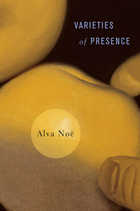
The world shows up for us—it is present in our thought and perception. But, as Alva Noë contends in his latest exploration of the problem of consciousness, it doesn’t show up for free. The world is not simply available; it is achieved rather than given. As with a painting in a gallery, the world has no meaning—no presence to be experienced—apart from our able engagement with it. We must show up, too, and bring along what knowledge and skills we’ve cultivated. This means that education, skills acquisition, and technology can expand the world’s availability to us and transform our consciousness.
Although deeply philosophical, Varieties of Presence is nurtured by collaboration with scientists and artists. Cognitive science, dance, and performance art as well as Kant and Wittgenstein inform this literary and personal work of scholarship intended no less for artists and art theorists, psychologists, cognitive scientists, and anthropologists than for philosophers.
Noë rejects the traditional representational theory of mind and its companion internalism, dismissing outright the notion that conceptual knowledge is radically distinct from other forms of practical ability or know-how. For him, perceptual presence and thought presence are species of the same genus. Both are varieties of exploration through which we achieve contact with the world. Forceful reflections on the nature of understanding, as well as substantial examination of the perceptual experience of pictures and what they depict or model are included in this far-ranging discussion.

Voices of Experience was designed and written with teachers-in-training and seasoned professionals in mind; the book would be used differently by each.
The book has five units: The Classroom Environment, Lesson Planning, Pair and Group Work, Classroom Interactions, and Classroom Trouble Spots. Each unit has two or three chapters that discuss the survey responses and relevant quotes from participants. Each unit concludes with a Connections section that features:
· *Challenging Beliefs: What Teachers Think, which presents a statement for readers to respond to and compare their responses to others who completed the survey.
· * Classroom Connections: What Teachers Do, which lists reflection or discussion questions
· * Strategies and Motivations: What Teachers Say, which presents more quotes from respondents, particularly those that look at what’s behind teachers’ choices. These too could be used for reflection or discussion.
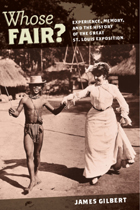
The 1904 St. Louis World’s Fair was a major event in early-twentieth-century America. Attracting millions of tourists, it exemplified the Victorian predilection for public spectacle. The Fair has long served as a touchstone for historians interested in American culture prior to World War I and has endured in the memories of generations of St. Louis residents and visitors. In Whose Fair? James Gilbert asks: what can we learn about the lived experience of fairgoers when we compare historical accounts, individual and collective memories, and artifacts from the event?
Exploring these differing, at times competing, versions of history and memory prompts Gilbert to dig through a rich trove of archival material. He examines the papers of David Francis, the Fair’s president and subsequent chief archivist; guidebooks and other official publications; the 1944 film Meet Me in St. Louis; diaries, oral histories, and other personal accounts; and a collection of striking photographs. From this dazzling array of sources, Gilbert paints a lively picture of how fairgoers spent their time, while also probing the ways history and memory can complement each other.

Some were widowed young, while others were married for decades. Some cared for their late partners through long terminal illnesses, while others lost their partners suddenly. Some had male partners, while others had female partners. Yet each of these women faced the same basic dilemma: how to go on living when a part of you is gone.
Widows’ Words is arranged chronologically, starting with stories of women preparing for their partners’ deaths, followed by the experiences of recent widows still reeling from their fresh loss, and culminating in the accounts of women who lost their partners many years ago but still experience waves of grief. Their accounts deal honestly with feelings of pain, sorrow, and despair, and yet there are also powerful expressions of strength, hope, and even joy. Whether you are a widow yourself or have simply experienced loss, you will be sure to find something moving and profound in these diverse tales of mourning, remembrance, and resilience.
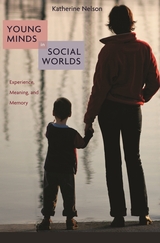
Katherine Nelson re-centers developmental psychology with a revived emphasis on development and change, rather than foundations and continuity. She argues that children be seen not as scientists but as members of a community of minds, striving not only to make sense, but also to share meanings with others.
A child is always part of a social world, yet the child's experience is private. So, Nelson argues, we must study children in the context of the relationships, interactive language, and culture of their everyday lives.
Nelson draws philosophically from pragmatism and phenomenology, and empirically from a range of developmental research. Skeptical of work that focuses on presumed innate abilities and the close fit of child and adult forms of cognition, her dynamic framework takes into account whole systems developing over time, presenting a coherent account of social, cognitive, and linguistic development in the first five years of life.
Nelson argues that a child's entrance into the community of minds is a slow, gradual process with enormous consequences for child development, and the adults that they become. Original, deeply scholarly, and trenchant, Young Minds in Social Worlds will inspire a new generation of developmental psychologists.
READERS
Browse our collection.
PUBLISHERS
See BiblioVault's publisher services.
STUDENT SERVICES
Files for college accessibility offices.
UChicago Accessibility Resources
home | accessibility | search | about | contact us
BiblioVault ® 2001 - 2024
The University of Chicago Press









